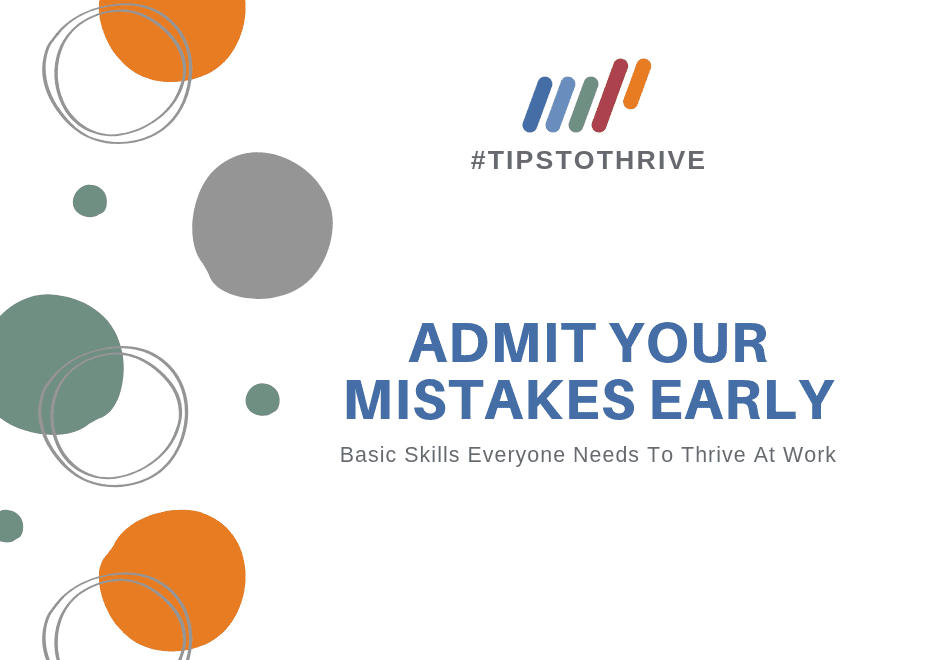Tips to Thrive At Work – Self Awareness
In order to thrive in the world of work and contribute to the delicate workforce ecosystem, we all must commit to being self-aware. This doesn’t mean you can’t be your authentic-self or embrace the diversity that your individual style and quirks offer – it means you are willing to reflect on how you may be perceived by others.
 |
Be Aware of What Makes You TickWe all have things that fuel us and things that drive us a little crazy. Knowing what makes you tick can help you find inspiration in times of defeat, and can help you strategize ways to overcome common annoyances that could trigger your frustration. |
 |
Consider How Others Perceive YouYou have probably heard the expression, “you catch more flies with honey.” Ultimately, what this means is that to achieve favorable results and build solid relationships, you need to be aware of how you come across to others, and be willing to adjust your approach when necessary. |
 |
Keep Your Motives In CheckWe all have personal reasons behind the choices we make. Being aware of the motives behind your choices and keeping them in check can help you make the best possible decisions to propel you forward in your career, and you will be more likely to have the ability to sustain that momentum. |
 |
Check-in or Check-OutHow engaged you are at work is a personal choice. If you truly want to thrive at work, you must be committed to being checked-in and doing your very best each day. If you are at the point where you are just showing up and not caring about the quality of your work, then it is time to make some important professional decisions about your future. |
 |
Temper Your Emotional ResponsesHaving intense emotional responses at work can hurt you professionally and damage your credibility. You are human and will naturally experience different emotions in the workplace – what is important is knowing how to manage those emotions in the most productive way, and paying attention to warning signs that you could be nearing an outburst. |
Want More Tips?
Click on the links below to access other tips we have shared throughout this series.
 |
 |
 |
 |
 |
 |
 |
 |
|



 Most of the time, when you hear someone use the phrase ‘self-awareness’, it’s in connection with personal growth, and about how understanding yourself can help you improve. That’s true; but have you ever thought about how self-awareness can be a valuable job search tool as well? Think about it: there are lots of different jobs out there, but not all of them are going to be the right fit for you. Where do you start, and what is the best way to utilize your valuable job-seeking time and energy to ensure the best results? Understanding yourself, your skills, your work preferences, and your expectations is an important part of putting that puzzle together. Here are some questions you can ask yourself to help increase self-awareness in your job search and improve long-term results:
Most of the time, when you hear someone use the phrase ‘self-awareness’, it’s in connection with personal growth, and about how understanding yourself can help you improve. That’s true; but have you ever thought about how self-awareness can be a valuable job search tool as well? Think about it: there are lots of different jobs out there, but not all of them are going to be the right fit for you. Where do you start, and what is the best way to utilize your valuable job-seeking time and energy to ensure the best results? Understanding yourself, your skills, your work preferences, and your expectations is an important part of putting that puzzle together. Here are some questions you can ask yourself to help increase self-awareness in your job search and improve long-term results:








 Do you want to experience increased job satisfaction? Have you ever wanted to see your ideas implemented in the workforce or be given more autonomy? What about increasing you long-term earning potential and career longevity? If you answered yes to any of those questions, recognize you have more control over
Do you want to experience increased job satisfaction? Have you ever wanted to see your ideas implemented in the workforce or be given more autonomy? What about increasing you long-term earning potential and career longevity? If you answered yes to any of those questions, recognize you have more control over 